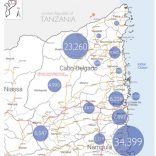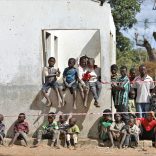Mozambique: Terrorism is a challenge to fundamental rights - Ombudsman in Palma district
Cabo Delgado: “We need to improve the investigation of armed attacks”

Photo: Twitter / @CesarGuedesF
A terrorism seminar in Pemba has concluded that the attacks in Cabo Delgado must be further investigated so that those responsible can be identified and punished. Suspects are being released for lack of evidence.
Officially, the attacks in the Mozambican province of Cabo Delgado are not classified as terrorism. But the brutality of the attacks is indisputable.
Since October 2017, attackers have burned down villages, beheaded men and women and forced residents to flee their homes.
“The incursions of this group are characterised by the destruction of public and private infrastructure, the looting of goods and brutal murders, culminating in the displacement of populations to safe areas, with an emphasis on urban centres and islands. This brings with it negative impacts on the level of health, food security and also great challenges with regard to humanitarian assistance,” provincial permanent secretary of Cabo Delgado António Mapure says.
Mapure was speaking in Pemba, the provincial capital of Cabo Delgado, during a three-day anti- terrorism training for officials of the Mozambican Armed Defence Forces, members of the National Criminal Investigation Service, and judges and public prosecutors.
According to Médecins sans Frontières, more than 700 people have died in the last two-and-a-half years in Cabo Delgado in violent and indiscriminate attacks carried out by individuals yet to be identified.
The United Nations High Commissioner for Refugees (UNHCR) says more than 100,000 people have been forced to leave their homes in search of safety.
César Guedes, United Nations Office on Drugs and Crime (UNODC) representative in Mozambique, says his establishment is committed to supporting Mozambique in the fight against terrorism.
“UNODC’s ongoing project to support SADC [Southern African Development Community] member states to strengthen the criminal justice response is based on the rule of law to prevent and combat terrorism. Violent extremism gives us the opportunity to implement our mandate here today in Pemba,” Guedes said.
Strengthening capacity for Investigation, Prosecution & Adjudication of terrorism offences 🇲🇿 🇺🇳 Pemba CD 10-12 March 2020 Thx 🇨🇦 🇺🇸 @ONUMocambique @CandiceWelsch @MiwaKatoEmpower @GhadaFathiWaly @UNODC_ROSAF @JohnBrandolino @CanHCMozambique @UNODC_TPB @UNODC #counterterrorism pic.twitter.com/UWTJWcCAjR
— Cesar Guedes (@CesarGuedesF) March 10, 2020
Failed investigation
Dozens of people have been arrested in recent years on suspicion of involvement in the attacks in northern Mozambique. Detainees are often released for lack of evidence. According to António Mapure, it is necessary to improve investigative capacity.
“The expectations generated are undermined when the progress of [criminal] cases results in a waiver of assessing the merits of the case, referring the case for further evidence collection, or even resulting in the acquittal of the defendants,” Mapuro said. “Investigations enriched by the content of this and other similar trainings and carried out with the necessary expertise, give criminal cases the necessary robustness.”
During an intervention at the meeting in Pemba, Assistant Attorney General Américo Julião highlighted the need to respect human rights in actions to combat terrorism in Cabo Delgado.
“We hope that, at the end of this training, trainees will have greater understanding and knowledge about the responses of criminal justice to terrorism and the importance of respecting human rights in the fight against terrorism, and that they will have better practical knowledge to make the investigation, prosecution and trial of terrorism crimes more effective,” he said.
This is the third UNODC terrorism seminar in Mozambique. Two previous trainings took place last year in Pemba and Maputo.
The Pemba meeting, which started on Tuesday (10-03) and ends today (12-03), has included the participation of international experts in the fight against terrorism.












Leave a Reply
Be the First to Comment!
You must be logged in to post a comment.
You must be logged in to post a comment.